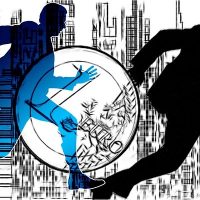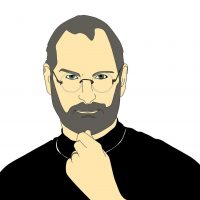This time, Inamori* spoke about the above motto in Kyocera philosophy.
What Inamori said is quoted with “”.
“ When we stood at a rare and historic turning point—perhaps one that comes only once in a hundred years—I felt that if we held back saying, ‘We lack the knowledge, we lack the experience,’ the next opportunity might not come again for another century. That sense of urgency drove me to establish DDI and venture into the telecommunications business.
Since its founding, Kyocera has become accustomed to ‘doing what seems impossible.’ With intense and deliberate focus, we’ve approached even the smallest matters with deep thought and full commitment, as if navigating through darkness with every nerve on edge. We have always chosen to think for ourselves and walk on our own two feet. I believe that very attitude proved vital in managing DDI. “

Today, as we live through the Reiwa era, we find ourselves in the midst of a massive structural transformation.
– The rise of AI is said to be replacing human jobs
– “Investment” is now considered more important than mere “saving”
– Globalism and nationalism are clashing, dividing the world
In such a time, it is hard to believe that we can survive by simply following the manuals of the past.
Given these global conditions, it is clear that conventional ways of doing business are no longer sufficient.
In exploring new business strategies and guiding principles, creativity and originality will be crucial.
The originality Inamori refers to here, I believe, is born through the following process:
1. Driving oneself into a corner—reaching a point of desperation
2. Asking daily, “Is this really the right way?”
3. Making your own decisions and learning humbly
Let me explain them one by one.
1. Driving oneself into a corner—reaching a point of desperation
” ’When driven into a corner, a path will surely open.’
In other words, I intentionally placed myself in dire situations—times of hardship and difficulty—so that I could discover and create new technologies from within that pressure.
In the same way, Ninomiya Sontoku delved deeply into Yangming philosophy, and through that study, came to understand the natural order of heaven and earth—the same ‘Way of Heaven’ that Confucius taught. At the same time, he came to realize the moral principles that human beings must live by. And he vowed to live in accordance with them.
The essence of this philosophy is captured in the phrase: When one acts with utmost sincerity, even heaven and earth will respond.
Sontoku believed that a sincere and wholehearted effort—persistence rooted in integrity—had the power to move the heavens and the earth. He truly believed that such sincerity and devotion could stir not only the cosmos, but even the spirits and gods:
‘Where there is true sincerity, even the gods and demons will step aside.’
He elevated this belief to a firm conviction: that if one devotes themselves with pure intent and relentless effort, heaven and earth—and even divine forces—would come to their aid. ”
→ Even Heaven and Earth Will Move for It.
This is what it means to be in harmony with the universe. It is also the moment when we become aware of the wisdom—the deep knowing—that already exists within our subconscious and inner spirit.
When we look back at the rise and fall of civilizations and human lives throughout history, we find that hidden within them are countless hints about how to live into the future.
The maxims and proverbs passed down over time may well be the distilled essence of such wisdom.
But to notice these signs and truths, we ourselves must be driven to the edge—pushed into a state of fierce intensity, a state where our very spirit is ignited.
Only then do we become capable of sensing the hidden truths that lie beneath the surface.

2. Asking daily, “Is this really the right way?”
” In the section titled ‘Valuing Originality’, there is a line that says:
‘Every single day, we must continue to make small creative improvements.’
Each of these improvements may seem minor on its own. But after a year, two years—or in our case, thirty-nine years—they accumulate. Over time, they can amount to something truly great. “
→ The opposite of originality is clinging to pre-existing answers and fixed patterns. This is what we call falling into a rut or becoming stagnant.
When we hold on too tightly to the idea that “it must be done this way,” we become trapped by those models and blind to the deeper truths—such as the laws of the universe or the wisdom that we naturally carry within as human beings.
Bound by such rigid conventions, we may find ourselves unable to move forward. Eventually, we begin to reject all originality and new possibilities, dismissing them without even trying.
In this kind of mindset may lie the end of both civilizations and individual lives.
That’s why I want to always remain humble and reflective—constantly asking myself, “Is this really the right way?”

3. Making your own decisions and learning humbly
“ I once had a visit from a major Japanese corporation. They came to us because we had successfully exported industrial plants to the former Soviet Union. They asked me, “Mr. Inamori, how did your company manage to succeed?”
When I heard that, I thought to myself, ‘Oh dear… what a shame.’
These companies are filled with brilliant individuals from the most prestigious universities in Japan. Naturally, I had assumed that such firms would forge their own paths based on their own ideas.
And yet, here they were, asking a small company in Kyoto for guidance.
That mindset—relying on others rather than thinking for oneself—cannot lead to successful management.
There are many executives who, when they face challenges, casually think, ‘If I just ask someone, I’ll be given a quick solution.’
If it were small companies seeking advice from large corporations, that would be understandable. But when large corporations come to ask small businesses—merely because they’ve heard of some success—how they did it, that very mindset reveals why their own management efforts are failing. “
→ “Even Heaven and Earth Will Move” — this phrase expresses the heart of Eastern philosophy: the deep connection between the cosmic order and the human soul.
If we work earnestly and give our best with sincerity, then Heaven and Earth—nature itself—and even unseen forces will support us.

Inamori explains what we must do to receive that support, using the example of Ninomiya Sontoku:
Don’t wait until a crisis arises. From day to day, think with total seriousness and full concentration.
Strive to remain connected with the universe. Make constant efforts to stay attuned to inspiration and divine insight.
Conduct every possible simulation and mental preparation.
These, I believe, are essential practices.
I am still far from perfect in this regard, but I believe this is something that anyone can begin to do—and so I intend to walk this path as well.
To do that, we must keep our inner antenna alert at all times, observe incoming information with humility, and without arrogance, take action. Through practice and experience, we can refine our way of being.
In conclusion, to truly honor and cultivate originality, we must continually push ourselves to the edge, stay connected to the universe, remain humble and straightforward, and think and act with integrity.
I myself still have much to learn, but from today onward, I intend to renew my dedication to the path of originality and creativity.

* Mr. Kazuo Inamori, the founder of Kyocera, KDDI (one of the top tele communication companies in Japan) and the top of revitalization project of JAL. As a well-known Japanese entrepreneur, he has been sharing his experiences and management know-how with managements of small to middle companies in Japan.
Further queries or doubts, please email to ytomizuka@abrilsjp.com
News Letter subscription is here











